Token Economy
- Provides positive reinforcement.
- Strengthens expected behaviors.
- Eliminates and / or decreases off-task behaviors.
- Promotes learning engagement in students.
Token economy is a strategy of positive reinforcement that can be provided to children in the form of tokens for completing the assigned tasks. The purpose of this study is to examine the effectiveness of using the token system in children with Autism Spectrum Disorder (ASD), namely, the impact of this intervention on eliminating or reducing off-task behaviors.
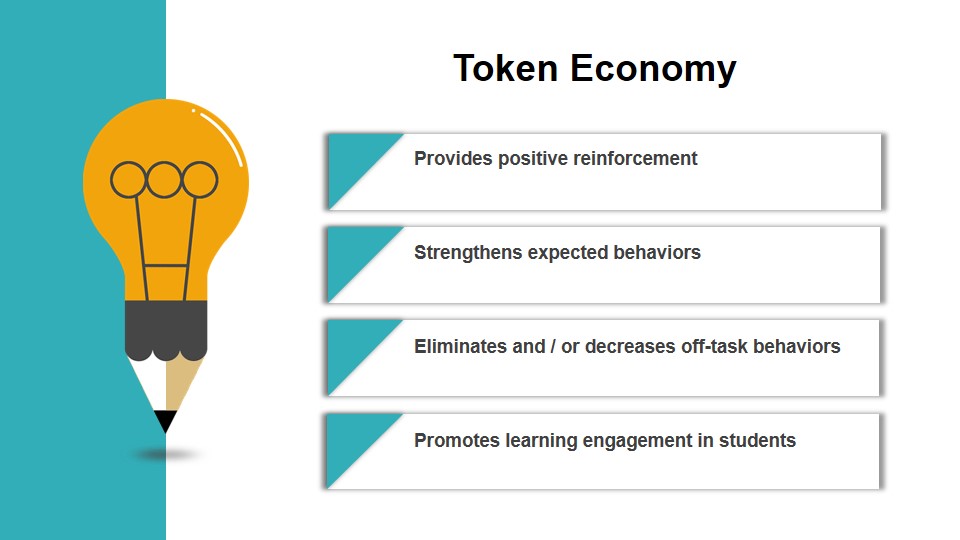
Literature Review
- Intangible Tokens:
- The website can be used for providing tokens; for example, a Class DoJo (McCurdy & Cole, 2014).
- Tangible Tokens:
- The use of tokens is effective to engage children; however, the selected back-up reinforcement is the decisive factor (Carnett et al., 2014; Fiske et al, 2015).
- Peer-Mediated Intervention (PMI):
- Decreases off task-behaviors (McCurdy & Cole, 2014).
- Repetitive Actions:
- Appear in highly functioning students with autism and ADHD (Stasolla et al., 2017).
- Self-Monitoring:
- Observation of one’s behavior improves a focus on a task (Davis et al., 2014).
For example, McCurdy and Cole (2014) assume that peer-mediated intervention (PMI) can decrease off-task behaviors and positively impact work completion. The hypotheses suggested by these authors are confirmed in their article based on the multiple-baseline design study. These results are consistent with the opinion of the National Professional Development Center on Autism Spectrum Disorders since the paramount goal pursued in the assistance to such children is communication promotion.
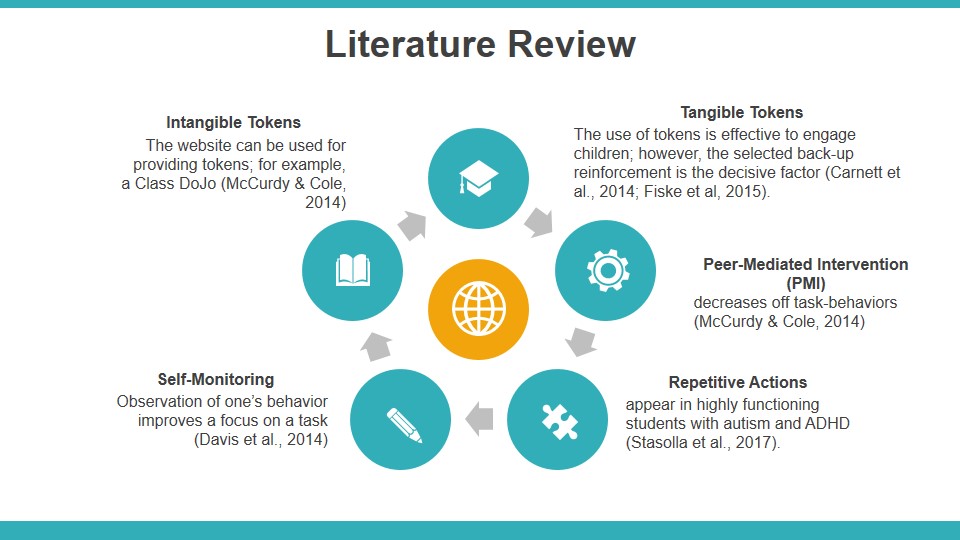
Participants, Setting, and Materials
- Setting:
- 8:1:2 self-contained structured classrooms;
- Peers acting as role models;
- Sensory station for tapping;
- Individualized schedules.
- Materials:
- Tablets with a token economy application; or
- Physical token board;
- Tangible and visual tokens.
- P., 11, ASD and ADHD: Receives Speech, Occupational Therapy, Counseling, and ABA at home.
- G., 12, ASD: Moderate communication, poor concentration.
- C., 10, ASD and Oppositional Defiant Disorder (ODD): Occupational Therapy, counseling.
The three students were enrolled in this study to understand their responses towards the token economy system and discover its potential. The information about the participants is presented on the slide. It should be stated that all of them learn in the general classroom and also receive occupation therapy and counseling lessons.
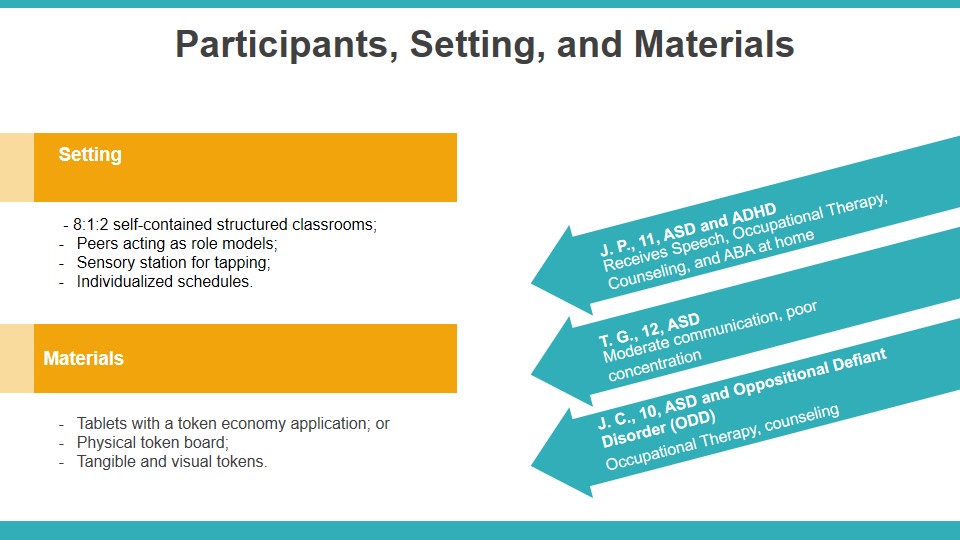
Design and Procedures
- Inter-observer Agreement (IOA).
- Experimental design (ABAB).
- Data Collection.
- 20 sessions, 30 minutes each.
- Variables.
- Independent (token economy system); independent (off-task behavior cases).
This study used the ABAB design that is based on a baseline period:
- Is followed by a treatment;
- In two phases.
The data collection process uses the template tables for noting all cases of misbehavior during the sessions. Data analysis is presented in the format of graphs and tables with the calculations in both baseline and intervention periods.
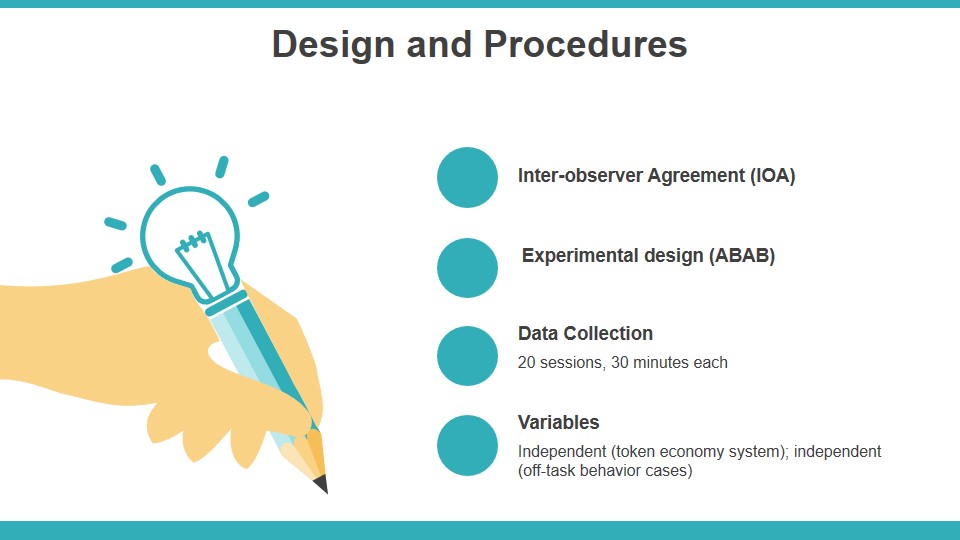
Results
- J. P. the reduction from 18-19 to 16-17 cases in baseline and from 14-15 to 10-12 cases in intervention.
- T. G. Showed high variability in responding with the average number of 13 cases in baseline and 9 cases in the intervention period.
- J. C. demonstrated significant drop of off-task behaviors in both phases.
While J. P. shows higher variability of results, is not characteristic of two other participants’ responses. the percentage of non-expected behaviors decreased by 11.9% in T. G. (from 117 to 103 cases), 14.7 % in J. P. (from 170 to 145 cases), and 18.8% in J. C. (from 117 to 95 cases).
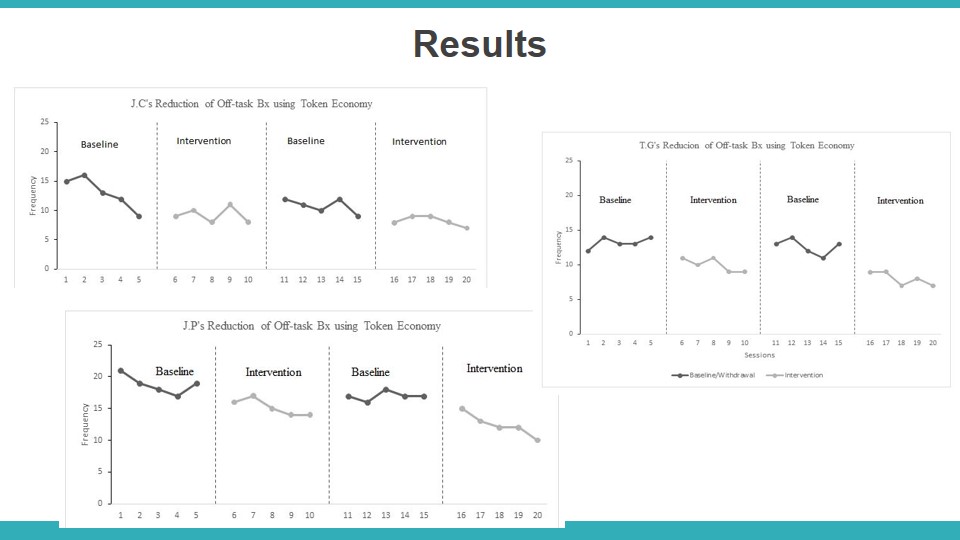
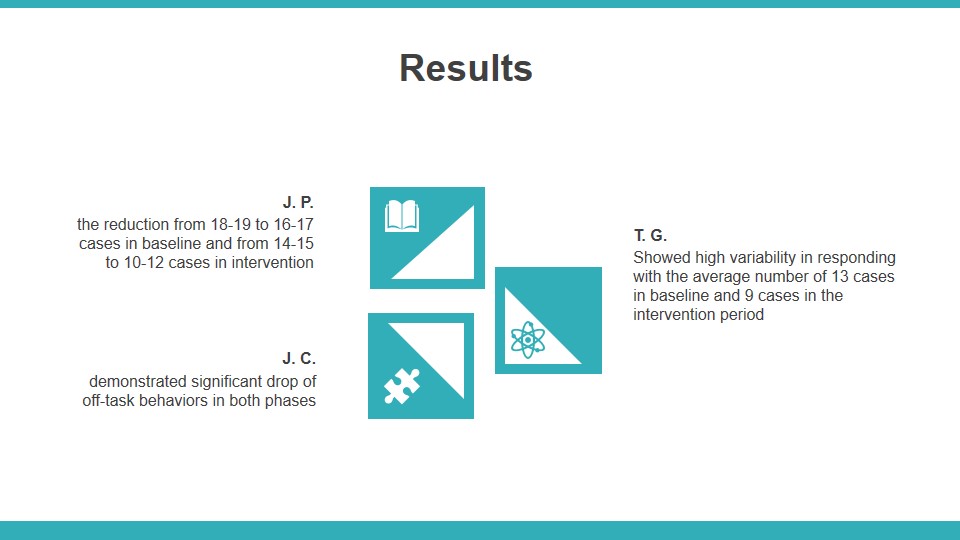
Discussion
In total, 20 sessions were conducted, each of which consisted of 30 minutes.
The token reinforces used in the study helped the students to provide correct answers and reduce their off-task behavior.
In particular, the key trend is that they showed the decrease in disruptive actions, including poor concentration, talking, and being out of seat.
The undesired behaviors were decreased essentially due to the implementation of the token economy system.
The data shows that from ten occurrences of inappropriate behavior in baseline, it reduced steadily to 3-4 incidents in the intervention observation.
The out-off task behavior cases are disruptive to the academic performance of students since it violates the learning process and leads to poor concertation.
In case of J. P., who has attention deficit hyperactivity disorder (ADHD) and prefers peer support to complete the tasks, it is possible to assume that other reinforces would less effective.
The results obtained based on the data from two other students show that the educators selected correct reinforces, which decreased the variability of their responses.
- Limitation:
- The absence of some students delayed the sessions of the token system.
- Implications:
- For educators, the use of tokens is likely to help in diminishing misbehaviors and facilitating the work with children having autism spectrum disorders.
- The variability of responses and the absence of participants should be explored in further studies.
With the decrease in such behavior, the students receive more opportunities to be active in a class. In other words, the potential of the token system for children with autism can be regarded as great since it helps to reduce their non-desired behaviors.
The variability of responses can be regarded as the outcome of the effective implementation of the token economy system. One may suggest that it means that some of the reinforces used by the educators were more preferable to the students, while others lacked such success. This seems to indicate the fact that the results of the intervention may be dependent on the back-up reinforcement measures offered to the participants. As for the limitation, it should also be noted that this limitation was beyond the control of this study, while it would be better if the participants were offered the token system on a daily basis within the identified period. To conclude, the classroom atmosphere would be more positive and reinforcing for all students
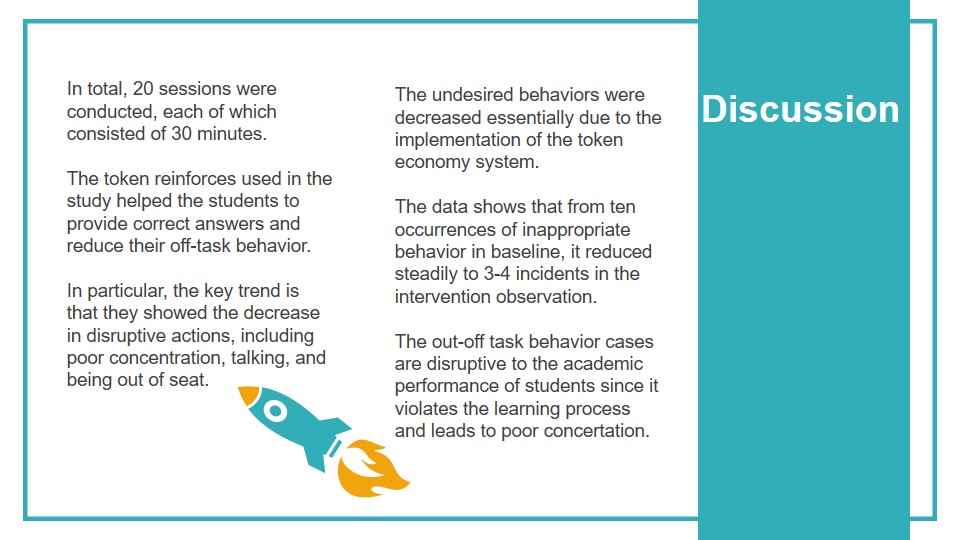
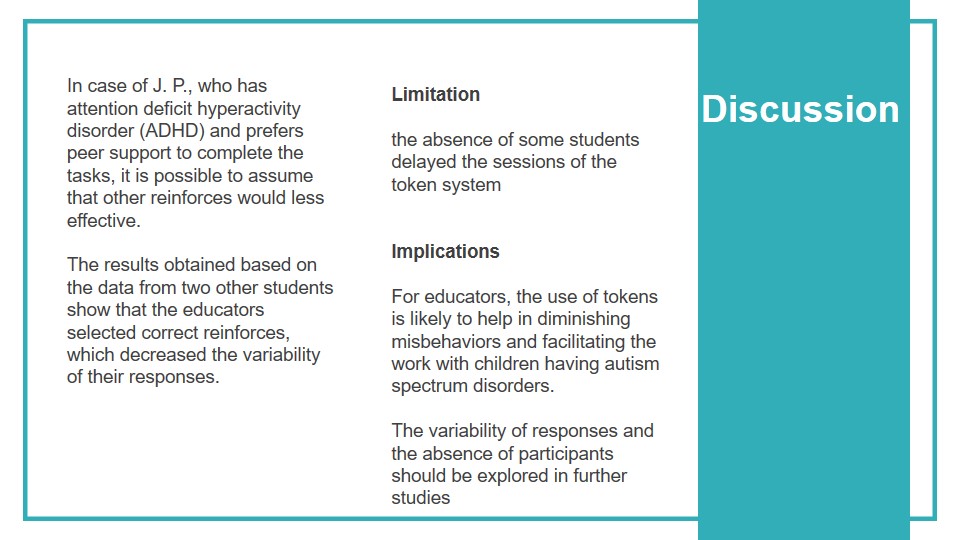
References
Carnett, A., Raulston, T., Lang, R., Tostanoski, A., Lee, A., Sigafoos, J., & Machalicek, W. (2014). Effects of a perseverative interest-based token economy on challenging and on-task behavior in a child with autism. Journal of Behavioral Education, 23(3), 368-377.
Davis, T. N., Dacus, S., Bankhead, J., Haupert, M., Fuentes, L., Zoch, T., … Lang, R. (2014). A comparison of self-monitoring with and without reinforcement to improve on-task classroom behavior. Journal of School Counseling, 12(12), 12-35.
Fiske, K. E., Isenhower, R. W., Bamond, M. J., Delmolino, L., Sloman, K. N., & LaRue, R. H. (2015). Assessing the value of token reinforcement for individuals with autism. Journal of Applied Behavior Analysis, 48(2), 448-453.
McCurdy, E. E., & Cole, C. L. (2014). Use of a peer support intervention for promoting academic engagement of students with autism in general education settings. Journal of Autism and Developmental Disorders, 44(4), 883-893.
Stasolla, F., Caffò, A. O., Perilli, V., Boccasini, A., Damiani, R., Albano, V., & Albano, A. (2017). Comparing self-monitoring and differential reinforcement of an alternative behavior to promote on-task behavior by three children with cerebral palsy: A pilot study. Life Span and Disability, 20(1), 63-92.